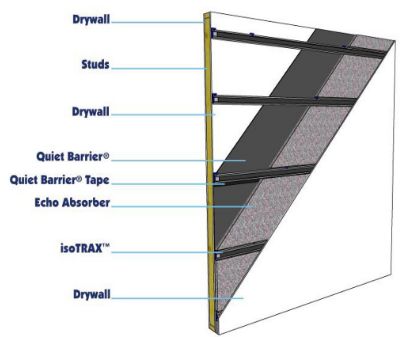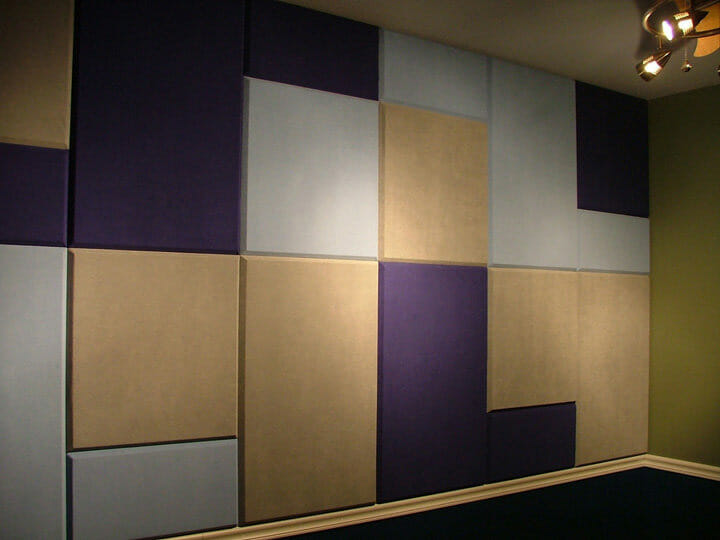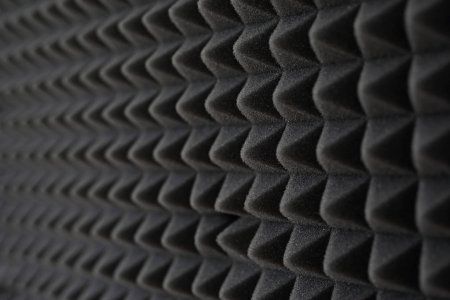Soundproofing walls can be vital for a peaceful home or productive workspace. Quality soundproof material can make a huge difference.
In today’s noisy world, finding tranquility is a challenge. Whether it’s loud neighbors, traffic, or household sounds, unwanted noise can disrupt peace and focus. Investing in the best soundproof materials can help you create a serene environment. This guide explores top soundproofing options, ensuring you make an informed decision.
Soundproof walls can significantly improve your quality of life. So, let’s dive in and discover the best materials to keep the noise at bay.
Introduction To Soundproofing
Soundproofing involves using the best materials to reduce noise through walls. Effective materials include acoustic panels, foam, and insulation.
Soundproofing is essential in creating a quiet, peaceful space. It involves using materials and techniques to block or absorb sound. This helps reduce noise and create a more serene environment. Soundproofing your walls can improve your quality of life. It reduces unwanted noise from outside or other rooms. Understanding soundproofing and its benefits can help you make better choices for your home or office.Importance Of Soundproofing
Soundproofing is important for several reasons. It creates a more comfortable living space. It also enhances privacy by preventing conversations from being overheard. In offices, soundproofing can boost productivity. It minimizes distractions and allows employees to focus better. In homes, it can improve sleep quality. Peaceful environments contribute to overall well-being.Common Noise Sources
Noise can come from various sources. Traffic is a major noise source in urban areas. Neighbors, especially in apartments, can also be noisy. Inside your home, appliances can be loud. Dishwashers, washing machines, and HVAC systems are common culprits. Even footsteps and voices can cause disturbances. Effective soundproofing addresses these noise sources. It creates a quieter, more enjoyable environment. “`
Credit: www.soundproofcow.com
Types Of Soundproof Materials
Soundproofing a room can significantly enhance your comfort and privacy. Choosing the right materials is crucial for effective soundproofing. Here are some of the best types of soundproof materials for your walls.
Acoustic Panels
Acoustic panels are one of the most popular soundproofing materials. These panels absorb sound waves, reducing noise and echo. They come in various shapes, sizes, and colors. You can easily install them on walls or ceilings. Acoustic panels are made from foam or fabric-wrapped materials. They are effective and affordable for home use.
Mass Loaded Vinyl
Mass Loaded Vinyl (MLV) is a dense, flexible material. It blocks sound transmission through walls and ceilings. MLV is heavy and thin, making it easy to install. You can attach it directly to walls, ceilings, or floors. It is also effective in reducing noise from outside sources. MLV is often used in studios and home theaters. It provides excellent soundproofing without adding much thickness to your walls.
Selecting The Right Material
Choosing the right soundproofing material for your walls is crucial. The right material ensures effective noise reduction. This section will guide you through the process. We will look at key factors to consider.
Assessing Noise Levels
First, assess the noise levels in your area. Determine if the noise is from inside or outside. Identify the type and source of the noise. This could be traffic, neighbors, or machinery. Measure the noise level using a decibel meter. The higher the decibel, the thicker the material needed.
Room Function Considerations
Next, consider the function of the room. Different rooms need different soundproofing. For a bedroom, you need complete silence. In a home office, you need minimal distractions. For a home theater, you need to block both incoming and outgoing noise. Consider these needs when choosing your material.

Credit: whisperwalls.com
Installation Techniques
Soundproofing walls can transform a noisy room into a peaceful haven. Proper installation techniques are crucial for achieving the best results. This guide will explore DIY and professional installation methods, and provide a step-by-step guide to installing soundproof materials.
Diy Vs. Professional Installation
Thinking about soundproofing your walls? You have two options: DIY or professional installation. DIY can save money. It requires basic tools and patience. Follow instructions carefully for effective results. Mistakes can lead to poor soundproofing. Hiring professionals ensures expertise and quality work. They have the right tools and experience. Professional installation is costlier but guarantees optimal soundproofing. Consider your budget and skills before deciding.
Step-by-step Guide
Ready to install soundproof materials? Follow this simple guide:
- Prepare the wall surface. Ensure it’s clean and dry.
- Measure the wall dimensions. Cut soundproof panels to size.
- Apply adhesive to the back of the panels.
- Press the panels firmly onto the wall.
- Seal edges with acoustic caulk. This prevents sound leaks.
- Install a second layer for extra soundproofing.
- Paint or cover the panels if desired.
Following these steps ensures effective soundproofing. Take your time and be precise.
Cost Considerations
Choosing soundproof materials for walls involves considering various cost factors. Different materials come with varying price tags. It’s essential to weigh these costs against your budget and needs. This section will help you understand the cost implications of different soundproofing options.
Budget-friendly Options
There are many affordable soundproofing materials available. Acoustic panels made from foam are a good choice. They are cost-effective and easy to install. Another option is mass-loaded vinyl. It provides good soundproofing at a reasonable price.
Weatherstripping tape can seal gaps and reduce noise. It’s a cheap and easy solution. Egg cartons are not a professional option, but they can help in a pinch. They are free and can absorb some sound.
Premium Materials
For those who can spend more, there are premium options. Soundproof drywall offers excellent noise reduction. It is thicker and denser than regular drywall. Green Glue is another high-end choice. It is a noise-proofing compound applied between drywall layers.
Acoustic insulation like fiberglass or rock wool is also effective. These materials are designed to absorb and block sound. They provide superior performance but come at a higher cost.
Maintenance Tips
Keeping soundproof walls in top condition ensures their effectiveness over time. Regular maintenance helps in preserving their quality. Below are some practical tips to maintain soundproof walls.
Cleaning Soundproof Materials
Dust accumulates on soundproof walls, affecting their performance. Use a soft, dry cloth to clean the surfaces weekly. For stubborn dirt, use a damp cloth with mild soap. Avoid using harsh chemicals. These can damage the material.
Longevity And Durability
Check for any signs of wear and tear regularly. Promptly repair any damages to maintain the wall’s integrity. Avoid placing heavy objects against the walls. This can prevent unnecessary pressure. Consider repainting or resealing if the material allows.
Case Studies
Soundproofing materials have become essential for various spaces. This section focuses on case studies showing the effectiveness of soundproof walls. By examining residential and commercial applications, we can understand their real-world benefits.
Residential Applications
Many homeowners seek peace and quiet. A family in New York faced noise issues from a nearby street. They installed soundproof materials on their walls. The result was a significant noise reduction. They could finally enjoy a quieter home environment.
Another example involves an apartment in Los Angeles. Thin walls made it hard for residents to sleep. The landlord decided to add soundproof panels. Tenants reported better sleep and less disturbance. This improved their overall quality of life.
Commercial Spaces
Businesses also benefit from soundproof walls. A recording studio in Nashville needed better acoustics. They invested in high-quality soundproof materials. The studio’s sound quality improved. Clients were happier with their recordings.
In an office in Chicago, noise from a busy street affected productivity. The company installed soundproof walls. Employees noticed an immediate drop in noise levels. They could focus better and work more efficiently.
Restaurants also face noise issues. A popular diner in Miami struggled with loud customer chatter. They added soundproofing to their walls. The dining experience became more pleasant. Customers appreciated the quieter atmosphere.
Future Trends
The future of soundproof material walls is evolving rapidly. New trends are shaping the industry, focusing on efficiency, sustainability, and innovation. These trends promise better soundproofing solutions for homes and offices. Let’s explore some key developments.
Innovative Materials
Emerging materials are transforming soundproofing. Researchers are developing lightweight yet effective options. One example is mass-loaded vinyl, which blocks noise without adding much weight. Another promising material is acoustic foam. It absorbs sound waves, reducing noise levels significantly.
Green materials are gaining popularity too. Recycled cotton and cellulose fibers are eco-friendly choices. They offer excellent sound absorption while being sustainable. Cork is another natural option. It’s durable and provides good insulation against sound.
Technological Advances
Technology is playing a crucial role in soundproofing. Advanced manufacturing techniques are creating more effective materials. Nanotechnology is one such innovation. It enhances the properties of soundproofing materials at a microscopic level.
Smart materials are also on the rise. These materials can adapt to changing sound levels. For example, some can become denser when exposed to loud noise. This adaptability ensures optimal soundproofing at all times.
Digital tools are aiding the design and installation of soundproof walls. Software can now predict the effectiveness of different materials. This helps in choosing the best option for specific needs. Precision in installation ensures maximum efficiency.

Credit: www.soundproofingstore.co.uk
Frequently Asked Questions
What Is The Best Material For Soundproofing Walls?
The best material for soundproofing walls is mass-loaded vinyl. It effectively blocks noise and is easy to install.
How Can I Soundproof My Existing Walls?
To soundproof existing walls, add acoustic panels or use soundproofing foam. Both options reduce noise effectively.
Are Soundproof Curtains Effective For Walls?
Soundproof curtains help reduce noise but are less effective than other materials. They are best for windows.
Does Foam Work For Soundproofing Walls?
Acoustic foam absorbs sound but isn’t the best for blocking noise. Use it with other materials for better results.
Conclusion
Choosing the best soundproof material for walls makes a big difference. It helps reduce noise and creates a peaceful environment. Options like acoustic panels, foam, and insulation are effective. Each material serves different needs and budgets. Consider your specific requirements before deciding.
Proper installation is also key to achieving the best results. Soundproof walls enhance comfort and privacy. Make informed choices and enjoy a quieter space.

